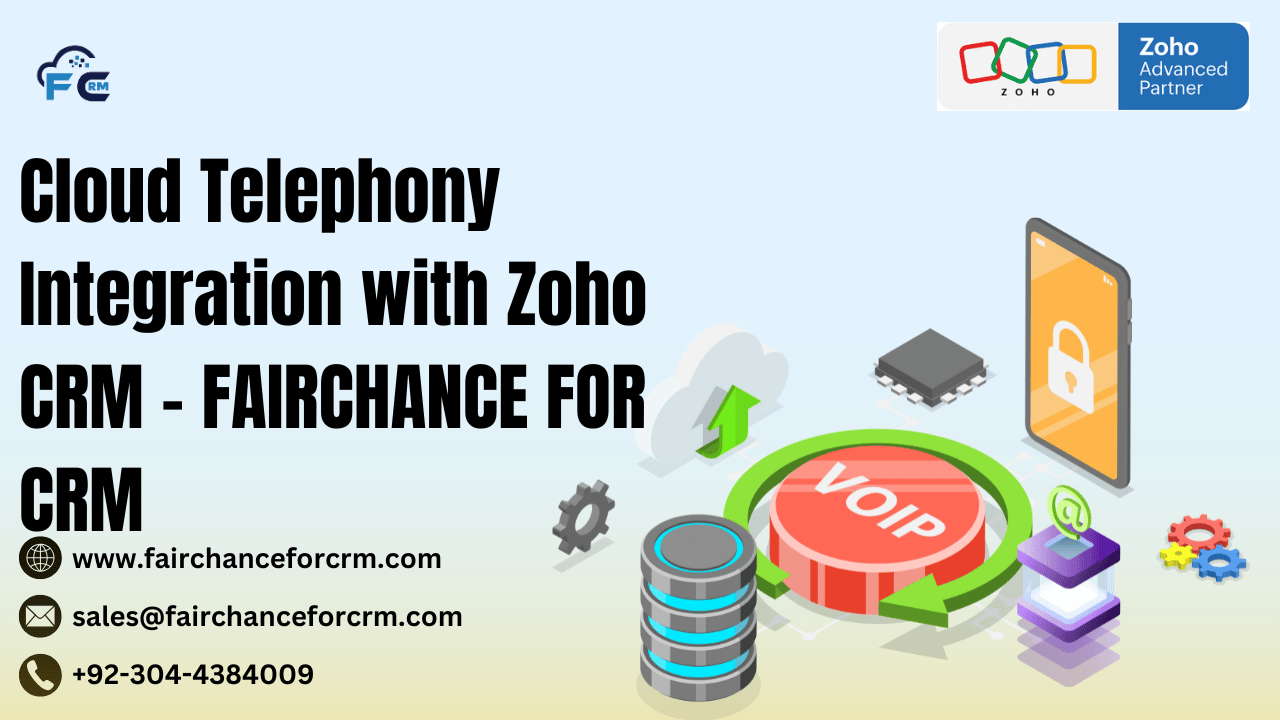Cloud Telephony Integration with Zoho CRM. Cloud, also known as Voice over Internet Protocol (VoIP), is a modern communication solution that uses the internet to deliver voice, video, and messaging services. Unlike traditional phone systems, which rely on physical infrastructure and telecommunication lines, cloud operates virtually through cloud-based systems, allowing businesses to connect with customers and teams regardless of location.
Cloud systems offer scalable, flexible, and cost-efficient communication channels, making them ideal for businesses seeking to streamline their operations and expand their reach. By leveraging the cloud, companies can avoid the high costs of maintaining traditional phone systems, while enjoying enhanced mobility and advanced features that improve communication.
Also Read:
- Top 7 Mobile CRM to Use in 2025 – FAIRCHANCE FOR CRM
- Make Your Business Smarter with Zoho IoT in 2025 – FAIRCHANCE FOR CRM
- What is Zoho ZeptoMail? FAIRCHANCE FOR CRM
- Zoho Finance Plus – FAIRCHANCE FOR CRM
- Zoho CRM Plus – Ultimate Customer Relationship Management
How Cloud Telephony Integration with Zoho CRM Works?
Cloud telephony converts voice signals into data packets that are transmitted over the internet, bypassing the need for traditional telephone lines. When a user dials a number, the call is routed through a third-party VoIP provider, which ensures the call is directed to the correct recipient.
With cloud, businesses can access the system through any device with an internet connection—whether it’s a laptop, smartphone, or desktop computer. This flexibility makes it an ideal solution for teams spread across different locations or those working remotely. Instead of relying on physical phone hardware, the entire system operates on cloud servers, with ongoing support and maintenance provided by the service provider.
In contrast to traditional Private Branch Exchange (PBX) systems, cloud telephony requires minimal physical setup and can be easily scaled as your business grows. Many providers offer subscription-based models, which allow businesses to pay only for what they use, ensuring a cost-effective solution.
Advantages of Cloud Telephony Integration with Zoho CRM
Cloud Telephony Integration with Zoho CRM offers a wide range of benefits that can positively impact your business operations. From reducing operational costs to enhancing team collaboration, here are some of the top advantages of adopting cloud:
1. Quick Setup and Easy Implementation
Since telephony doesn’t require physical hardware or complex installations, businesses can get up and running quickly. The provider handles all setup and configuration, freeing up your IT team from the task of managing infrastructure. This makes cloud telephony a hassle-free solution for businesses looking to scale fast.
2. Enhanced Flexibility and Mobility
With cloud telephony, your business can stay connected regardless of location. Employees can access the system from any internet-enabled device, making remote work and flexible office setups more feasible. Whether it’s a team working from home or staff traveling abroad, telephony ensures seamless communication.
3. Improved Security and Reliability
Cloud Telephony Integration with Zoho CRM often come with built-in security features like data encryption, two-factor authentication, and secure storage, helping to protect sensitive customer information. Additionally, since cloud systems are hosted on secure servers, they are less prone to hardware failure and downtime, offering better reliability than traditional phone systems.
4. Cost Efficiency
By removing the need for expensive on-site hardware and long-distance call charges, cloud can significantly reduce communication costs. It also eliminates the need for maintenance contracts, as your cloud provider manages the system. This makes cloud a cost-effective alternative for businesses of all sizes.
5. Scalable and Customizable
As your business grows, cloud systems can easily scale to meet increasing demand. Whether you’re adding new users, integrating additional communication tools, or expanding to new regions, cloud can be quickly customized to suit your needs without the need for major overhauls.
Integrating Cloud Telephony Integration with Zoho CRM
When Cloud Telephony Integration with Zoho CRM, the combination becomes even more powerful. By bringing together advanced communication tools and customer data, businesses can streamline their workflows, enhance customer interactions, and boost overall productivity. Here are some key benefits of integrating cloud telephony with Zoho CRM:
A) Seamless Call Management
Integrating cloud telephony with Zoho CRM allows teams to make and receive calls directly from within the CRM interface. Sales representatives can use features like Click-to-Call to quickly connect with leads and customers, ensuring faster response times and better customer engagement. With VoIP technology, international calls become more affordable, which helps reduce overall communication costs.
B) Global Reach with Virtual Phone Numbers
Cloud allows businesses to set up virtual phone numbers in any country, making it easier to support international customers. By linking these virtual numbers to Zoho CRM, companies can manage inbound calls from different regions in a unified platform. This feature is particularly useful for businesses with global operations or those looking to expand their customer base across borders.
C) Cost Savings and Streamlined Operations
Cloud eliminates the need for costly hardware and physical phone lines. With integration into Zoho CRM, businesses can handle all communications—from sales inquiries to customer support—directly within the CRM platform. This unified approach not only reduces operational costs but also centralizes customer information, improving the efficiency of your sales and support teams.
D) Improved Remote Work Capabilities
Zoho CRM integrated with cloud telephony enables employees to work from anywhere. Whether you’re managing a sales team, customer service reps, or even recruiting staff, they can access the CRM and communication tools from any location with an internet connection. This flexibility allows businesses to maintain continuity and provide high-quality customer service even during disruptions.
E) Advanced Call Analytics and Tracking
With telephony, businesses can track detailed call analytics such as call duration, wait times, missed calls, and more. By integrating this data with Zoho CRM, companies gain valuable insights into customer interactions. This information can help improve decision-making, optimize team performance, and fine-tune customer service strategies. Additionally, features like automatic call logging ensure that every call is logged into the CRM for easy reference and follow-up.
Conclusion
Cloud Telephony Integration with Zoho CRM brings significant advantages to businesses seeking to optimize their communication processes. From enhancing customer service to enabling remote work and reducing costs, the combination of cloud telephony and Zoho CRM provides a streamlined, unified solution that supports business growth. By leveraging this integration, businesses can improve lead conversion, reduce operational overhead, and ensure a better, more personalized customer experience—ultimately driving higher satisfaction and long-term success.
For more information about the Cloud Telephony Integration with Zoho CRM, visit this link.
If you want to Free Trail Zoho, click on this link.




